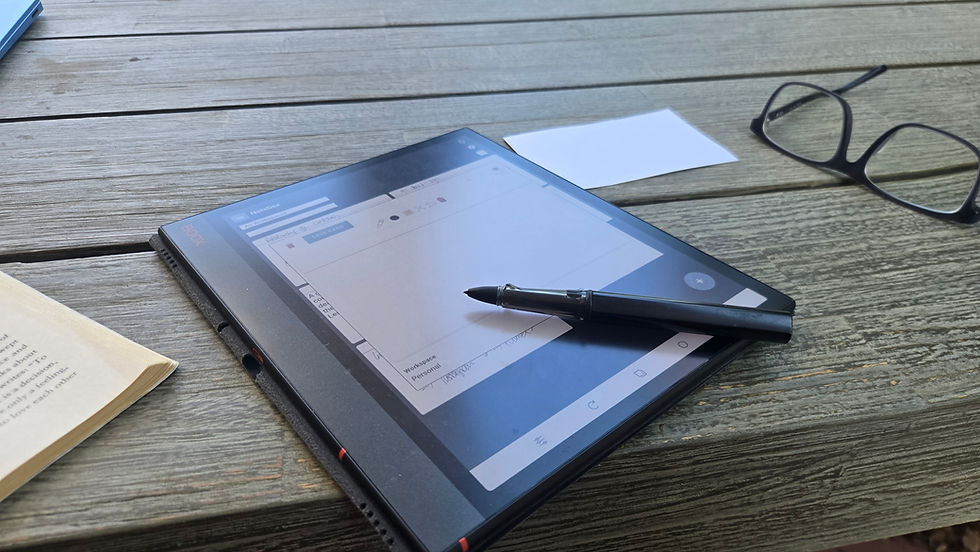The 5 Productivity Tools I Use Everyday to Keep Me Organized
- Prem Sundaram

- Jun 1, 2024
- 4 min read
Updated: Jun 11, 2024
As the CEO of NoteDex, and an information management consultant and productivity expert, I help businesses and individuals optimize their workflows, organize their data, and achieve their goals in their everyday life. In this blog post, I want to share with you five tools that I use in my daily work and how they help me be more efficient and effective.

1) Mindmap software for brainstorming. When I start a new project or face a complex problem, I like to use a mindmap software to visualize the main concepts, questions, and ideas. A mindmap is a diagram that shows the relationships between different elements in a hierarchical and non-linear way. It helps me to clarify my thoughts, generate new insights, and identify gaps or opportunities. I use a mindmap software that allows me to create, edit, and share my mindmaps online or offline, and also export them to other formats such as PDF or Word. My preferred Mindmap software is called EDrawMind by Wonderware. I've used a lot, including X-Mind, which is very good, but EDrawMind is just as capable and offers a one-time lifetime purchase license unlike the yearly subscription required by X-Mind.
2) NoteDex note taking software for capturing quick project notes and ideas - of course! When I'm working on a project, I often need to take notes of important information, feedback, or ideas that come up during meetings, calls, or research. I use NoteDex, to let me create digital cards with text, images, and web, audio or video links. I can organize my cards into project decks (Stacks), add tags, and search them easily. NoteDex also syncs with all my devices - Android Smartphone, iPad Tablet, Windows and MacOS desktop - so I can access my notes from any device and collaborate with others. Sometimes I even share a stack for free via the web-share feature and it helps me to share a stack of project information to one or more people. NoteDex really is my second brain to support my memory and capture knowledge.
3) Notion for a shared project plan and tasks with companies I work with. When I'm working with a company or a client, I need to have a clear project plan and tasks that we can track and update together. I use Notion, a powerful tool that combines notes, databases, wikis, calendar, schedule and more. I can create a customized workspace for each project, where I can add pages with different types of content such as tables, lists, kanban boards, timelines, etc. I can also invite the company or the client to join the workspace and edit or comment on the pages. Notion helps me to keep everyone on the same page and manage the project efficiently. It's not cheap but good for this use-case, and one of the more reliable pieces of collaboration software. It also has a good implementation of AI, templates, and good for capturing business processes.
4) My e-ink tablet for taking handwritten meeting notes. Sometimes, I prefer to take handwritten notes during meetings or presentations, because it helps me to focus better and remember more. However, I don't like to carry paper notebooks or pens around, because they are bulky and wasteful. That's why I use an e-ink tablet, a device that simulates the feel of writing on paper with a stylus, but without using any ink or paper. I can write or draw on the tablet as much as I want, erase or undo easily, and save my notes as PDF files. I can also sync my notes with my cloud storage or other apps, and share them with others. I know this is not software but a device. But hey, I'm squeezing this into this post! I use the Onyx Nova Air2 8" tablet and its really cute. Sometimes I will email the ink PDF to my computer.

5) Quick Notes App. This is a cute app that floats on top of other apps ('always on top') and also enables to be transparent. We also built this! It helps me to have a small window above everything else, especially useful when I am doing video chats or presenting - so I can have my speaking notes in front of all the video faces and it helps me to keep my eye on the camera yet also seeing both the video participants and my speaking notes overlaid on the screen. Kind of like a teleprompter style.
We're applying some of the learning from NoteDex into Quick Notes, but also allowing it to grow experimentally in a new direction as a desktop widget type app for taking quick notes. We just recently we added Audio recording, Speech to Text transcription, and Chat GPT4-o integration! Why Chat GPT? What this will do is - for instance - is if you recorded a meeting using the audio recording feature of the app then you can first transcribe the audio to text. Then if it was a long meeting you can use the Chat GPT prompt window we added to 'summarize' the notes. I've found this to be really helpful! It can generate a one paragraph point by point summary of the meeting, ideal for reference. I'm sure we will incorporate some of these concepts into NoteDex in the near future. Quick Notes App is available for both Mac and Windows!
Conclusion
So, there you have it! The 5 (+1) apps that I use on a daily basis that help to be productive with all the way from brainstorming, to capturing ideas, to planning and tasks, to taking notes during meetings, and when presenting. I hope you enjoyed this post and feel free to reach out and ask me any questions!





